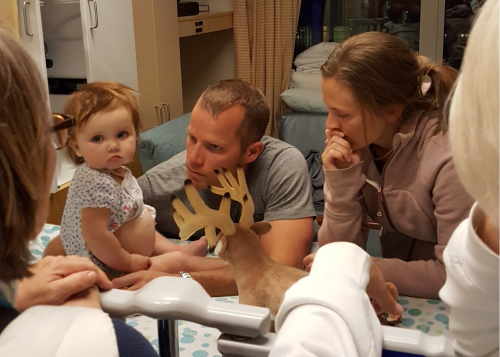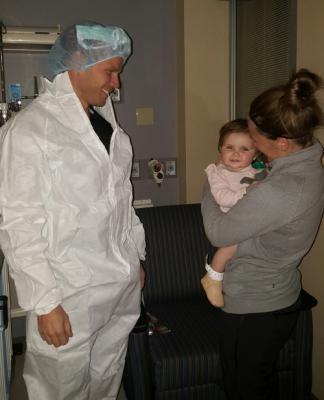Along the MMIHS journey, in the hospital setting and outside of it, you will work with all different kinds of people. From a person you speak with on the phone, to the secretary working at the desk, all the way to a surgeon who performs an operation; each of them, in their own way, is an essential part of the care that you yourself, or your loved ones receives. For this reason, it is important that each relationship you develop is done so with great respect and forethought.
However, there may be times when you have to push for answers or question the ones that you have been given. You may find yourself in a situation where you catch a "mistake(s)" and have to confront a nurse or other health care provider for not following hospital procedures.
Confrontation can be very uncomfortable but being an advocate for yourself or your child is just another challenging aspect of living with MMIHS. Knowing how to work your way up the chain of command to get what you need is a critical part of providing the best care for MMIHS patients.
Here is a list of tips that MMIHS families have come up with that will help you to be the best advocate you can be for yourself or your child. If you have any suggestions that should be added to our list please don't hesitate to contact us!

Relationships:
- Build a rapport with ALL the people that you see or work with regularly including your regular doctors - and especially your GI.
- The little things go a long way! Being polite and respectful when voicing concerns can build a 'team' between specialties, caregivers, and the patient and also help a team learn to trust parents / caregivers as their eyes and ears in observation of their patient.
- Remember, you often see the same people again and again so make a point to tell them when you are impressed with their care and show your appreciation for what they do.
- Advocate effectively without making “enemies” along the way.
-
While being inpatient, there are so many that can make or break a stay. Thank EVERYONE for what they do - that includes the lady or man who empties the garbage cans. They will WANT to do things to help a nice person, and ultimately you get much better care.

Communication:
- For any appointment, always go prepared with written down questions you want to ask (so you don't get side tracked and forget them!)
- If there is something 'odd' going on with your child, put it in writing to take to the appointment - an excel spreadsheet or something of the like with 'ins and outs' to 'prove' what you've seen can help medical professionals understand better and 'see' what you're seeing in a 'chart' form that is familiar to them.
- Often times the parent(s) are the "hub" between all of the different teams and specialists so effective communication is key!
- Don't be afraid to keep asking or ask for things to be repeated until you are comfortable and feel like you have a clear understanding or are satisfied with the answer.
- During important meetings or rounds you can ask for permission to record the audio of the conversation. That way you can share the conversation with family members who aren't present and also review the conversation at a later time.
- At the end of every important conversation with doctors, asking them to allow you to "recap" the conversation in your own words to make sure you understood it correctly can be very helpful. It also helps to accurately pass on info to other family members.
Advocating:
- Be clear about your expectations from the beginning. For example, when you have a new nurse or are in the ER, be specific about how you want things done BEFORE the nurse starts doing things (especially regarding how you expect them to handle/central line)
- As a patient or a parent remember that YOU are often the expert and it's okay to refuse things or ask to talk to a supervisor if something doesn't seem right.
- Remember that you have the right to ask for a second opinion or another doctor or nurse.
- An inpatient tip- some families have found it helpful to have copies of their current IV orders for things such as TPN and hydration before admission. While they often have to change it once admitted, this gives a good 'starting point' for doctors to see what has been done most recently at home.